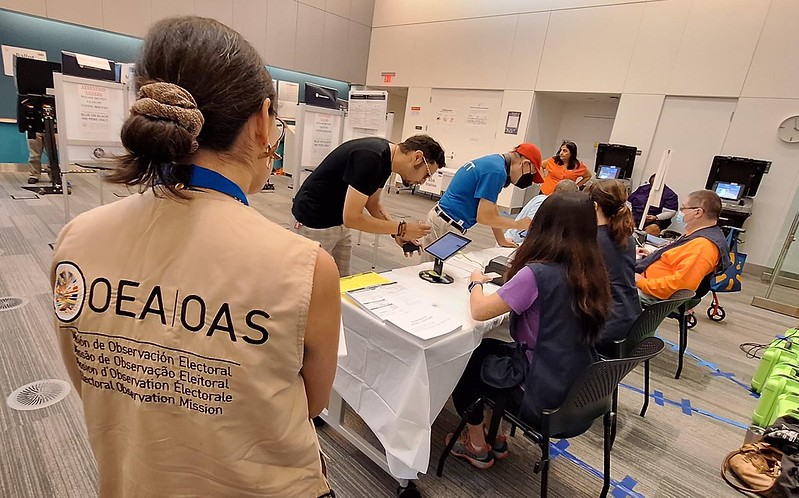DOP 2024
Securing election observers’ rights in a climate of rising polarization and insecurity

As election observers become increasingly subject to obstruction and intimidation, OAS has leveraged the DoP community to lobby for better political and legal protection for observers.
When election observers describe their work, they don’t see it as a passive activity; instead, they highlight a list of rights and freedoms they evaluate and advocate for in the electoral process, such as freedom of assembly, the right to run for office, the right to vote, freedom of speech and equality of the vote. Compared to the UN’s definition of a “human rights defender” – someone who, alone or with others, acts peacefully to promote or protect human rights, including civil and political rights – it’s clear that election observers fit this role. Yet, the push to have this connection officially recognized is relatively recent, spurred by a concerning deterioration in the conditions observers face.
Gerardo de Icaza, Director of Electoral Cooperation and Observation at the Organization of American States (OAS), who has been one of the driving forces behind the move, says that the environment markedly changed around the year 2020. They noticed that a rise in political polarization was leading to increasing obstruction of observers, particularly citizen observers, from doing their work. This ranged from delays in giving observers accreditation, severely limiting their ability to deploy around the country, to confisacation of their equipment and offices amid accusations of bias.
“Whereas previously a statement from OAS or other international organizations in a contested election would have had an impact to calm the situation down, we suddenly found that we ourselves were becoming the targets of abuse and conspiracy theories,” says de Icaza. Compounding this is the rising level of violence in the region: where ten years ago there were only a handful of countries in the OAS region where there were security concerns for observers, now there are only a handful where it is not an issue.
Realising that observers rights were often not well embedded in countries’ legal frameworks – sometimes only being included in a temporary regulation or even just in a manual of the election body – de Icaza felt that recognition of their rights as human rights defenders at the international level would be the most effective way to offer some level of protection.
Floating the idea at the annual implementation meeting of the Declaration of Principles (DoP) on international election observation meeting in Brussels in 2021, de Icaza found that many other DoP organizations were experiencing similar issues in other parts of the world.
The DoP community was crucial in moving the initiative forward: the UN Electoral Assistance Division helped involve the UN Special Rapporteurs on the situation of human rights defenders, Mary Lawlor, and on freedom of assembly and assocation, Clément Nyaletossi Voule, who issued a joint declaration stressing “that election observers are human rights defenders and civil society actors. States should therefore enable independent and impartial election observation by all monitors, including from abroad.”
The European Union, for its part, followed on, with High Representative/Vice-President Josep Borrell reaffirming the status of observers as human rights defenders.
An important next step was a resolution from the Inter-American Commission on Human Rights (IACHR) in April 2024. Here, DoP organizations The Carter Center and NDI have been instrumental in helping inform citizen observer groups in the OAS region that they now have the potential to take a case to the Inter-American Court of Human Rights, should their rights as obsevers be violated.
Currently, at the request of Luis Almagro, Secretary General of the OAS, the Council of Europe’s Venice Commission is working on a legal opinion on the issue, which is expected by the end of the year, and which could be instrumental in any cases being potentially be brought before the European or the Interamerican Courts of Human Rights.
These moves cannot come too soon for de Icaza. The impact on the current situation is having a huge impact on OAS observation activites, at the financial, logistical and human level. “Some of our observers have had to wear bullet-proof vests, and we increasingly need armoured vehicles,” he explains. “Whereas it used to be the head of mission’s decision whether to follow the chain of custody of ballot boxes from polling stations to counting centres at night, now it is first and foremost a decision for our security team.” Having observers’ rights enshrined at an international, legal level would be hugely beneficial when negotiating bilateral arrangements for observation missions, he explains, giving states more responsibility to protect and uphold observers’ rights.
Gerardo de Icaza will be speaking at the DoP annual implementation meeting in Gdansk on Thursday, 21 November 2024 at the session “Observer Rights and the Impact of Intimidation and Obstruction”, along with representatives of the European Parliament, the International Society for Free Elections, and the Venice Commission.
